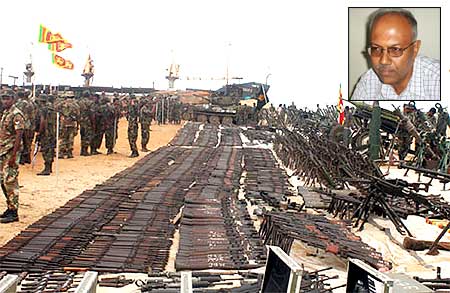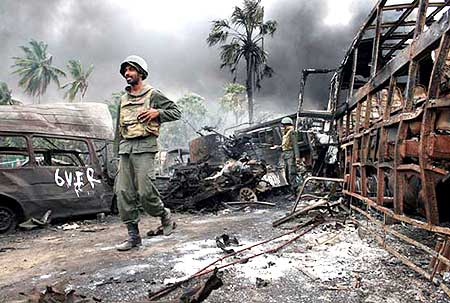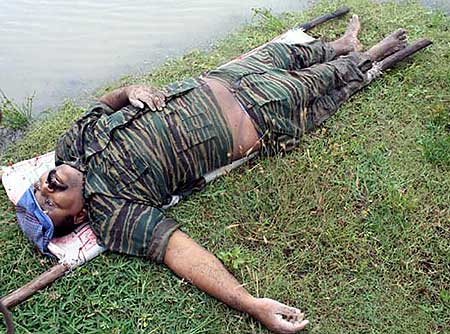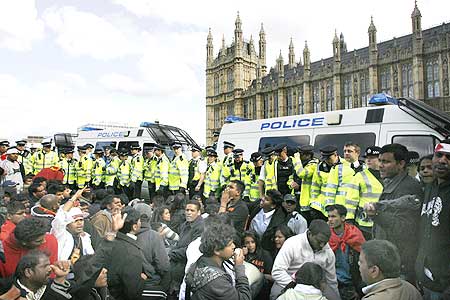
They looked upon him as a freedom-fighter. They looked upon him as a terrorist. In the same country. This was how Velupillai Prabhakaran, who took to the gun to erase the grievances of the Sri Lankan Tamils and give them an independent homeland, was looked upon.
In India, he was reviled as the man who orchestrated former prime minister Rajiv Gandhi's assassination; yet, his cause was an election issue in Tamil Nadu in the 2009 general elections.
His death at the hands of the Sri Lankan army, announced last week, marks the end of an era.
To understand its impact and repercussions, Savera R Someshwar and A Ganesh Nadar spoke to M R Narayan Swamy, author of two well-researched books on Sri Lanka: Inside An Elusive Mind: Prabhakaran and Tigers of Lanka: From Boys To Guerrillas.
What do you think caused greater damage to the LTTE -- Rajiv Gandhi's assassination or Colonel Karuna's (Prabhakaran's deputy) defection?
Four factors, I would say.
One, the first biggest blunder they committed was the assassination of Rajiv Gandhi in 1991.
The second big blunder they committed was in 2003 when they unilaterally walked away from the peace process. That really brought them down in the eyes of the international community.
The third factor that really hit them for within, although they did not realise it at that point in time, was the defection by Karuna and all his people which very interestingly coincided with a change of regime, bringing to power in India a woman he had widowed in 1991.
The fourth biggest factor was, of course, the very foolish decision of asking Tamils to boycott the presidential elections of 2005 which indirectly led to the victory of the man who has proved to be his nemesis.
Since 1991 to now, I would say these are the four most important factors that led to his downfall.
Was the US playing a double game?
No, I don't think anybody played a double game.
On the one side they were supplying arms to Sri Lanka, on the other side they were wringing their hands about the humanitarian crisis that was going on.
This is what I'm trying to say.
Please remember that even the Norwegians (who tried to broker peace between Sri Lanka and the LTTE in 2002-2003) at the end of the day got fed up. Off the record they were telling that they were being taken for a ride even by the LTTE. Everybody was taking everybody for a ride in Sri Lanka.
At one point, there was an attempt to demarcate between the LTTE and the Tamil civilian suffering. To the LTTE this was unacceptable. To the LTTE it was like saying you don't mind my dying, but you don't want him to die.
Everybody had supplied arms. Let me put it this way, you may have supplied arms or like the Indians you say I will not supply arms but I will give you lungis, I will give you caps, I will give you belts, I'll give you shoes, I'll give you clothes. You cannot use these to kill but the fact is that those who are going to kill are going to use all this. There is a very thin Lakshman Rekha between the fact that other nation gave weapons and we gave non-offensive things.
Watch out for the second part of the interview on how Prabhakaran's death could impact Sri Lanka and India.

Is the LTTE more dangerous after Prabhakaran's death?
The answer to this question can only be given when we know what remains of the LTTE. The worldwide global network that the LTTE commanded was focussed around an active insurgent group called the LTTE and its leader. Minus Prabhakaran, minus the LTTE as it has always existed, why would it be dangerous?
They can only become more dangerous if there is an organised form, if there is a leader, if there is somebody to give direction. You need weapons, you need ammunition, you need all that.
What about revenge coming in the way of peace?
There would be individual revenge motive. I am sure a lot of people who have killed innocent Tamils would have done it out of vengeance -- you killed my brother so I will kill too. Yes, you have Tamils seeking revenge but you have Sinhalese too. They too have suffered a lot. They too have been killed in this conflict.
But for this revenge to escalate, you need a certain organised machinery. The LTTE was an organised machinery. Replicating the LTTE is near impossible in these conditions. You need leadership, you need time, you need physical space. Today the Sri Lankans will not allow that. Let's assume for the sake of argument that Karuna were to say I am fed up and I want to restart the LTTE. They'll kill him!
Did you foresee something like this happening?
No. I could have never foreseen something like this for two reasons.
I never expected the war to end in this manner because the entire Sri Lankan story was understood by most people as the story of a stalemate. It was a stalemate that had to be broken with the help of outsiders, by prodding by outsiders so that the opposing parties come to some kind of an understanding. It was also very clear this stalemate could never be broken because both parties refused to compromise, refused to genuinely shake hands.
Having said that, the way the military stalemate was broken by the Sri Lankan State in the past two-three years was done with the ruthlessness in front of which Prabhakaran's ruthlessness pales into complete insignificance. In a way, the Sri Lankan State became an LTTE multiplied many times over. It dealt with the LTTE in a manner and in a language that the LTTE probably understood, unfortunately resulting in the statement that has come out on Sunday.
How would you define Prabhakaran's legacy?
There will be broadly two ways to look at what Prabhakaran has left behind. The fact is he started a movement that certainly had legitimate reasons behind it. The militancy was accepted by the social milieu at a certain point. But somewhere down the line the movement lost its focus.
The LTTE should have been the means to an end. I think, at some point, the LTTE became an end in itself.
Now that he is no more, there will be a huge number of people who will look at him as someone who fought and fought, who never compromised, unlike Tamil leaders of an earlier era. Who would not settle for anything less than Tamil Eelam. Who was passionate about it. Who was completely committed to the cause, however wrong or right it may have been, particularly when it came to the methods that he used.
At the same time, there will be any number of people who will look at him as a megalomaniac and a ruthless killer, somebody who thought all was fair in love and war.

How does his death affect the LTTE?
Prabhakaran's death could mark the end of the LTTE. The LTTE was founded by him, nurtured by him, built brick by brick by him. There is no LTTE minus Prabhakaran. When you discuss Prabhakaran, you are actually discussing the LTTE. The two words are synonymous. The LTTE can be best described in two words -- Velupillai Prabhakaran.
Prabhakaran was its number one leader, was its number two leader, was its number three leader all the way down to number 10. It had no other leader. It had only one God; it had only one icon; it had only one guru. Minus him, the LTTE may exist on paper but it will certainly not be the LTTE that the world has known for so long.
If he is no longer there, who do you think is going to take charge?
First of all, for someone to take charge, there will have to be an LTTE. I doubt if the LTTE will survive Prabhakaran's exit. I even doubt if the LTTE will survive this horrible onslaught that the Sri Lankan State has unleashed against it.
Let's not forget that, whatever may have been its faults, the LTTE is a very proud organisation. It would have not issued such a statement (giving up the battle) if there was any other alternative. It's like looking at a house where the head of the family is no more. When the building has collapsed, it makes no difference who is going to take charge of the ruins.
What's going to happen to the Tamils in Sri Lanka?
The first thing that is going to happen is that the Tamil suffering that we have seen, particularly in the recent past, will certainly come to an end. The Tamils, at least in the northern part of Sri Lanka, assuming the fighting stops, will not have to fear aerial attacks any more, will not be shelled any more, will not be brutalised any more.
That could be, of course, a welcome development vis-a-vis the war we have seen.
But if you are referring to the political problem that the Tamils have had, that is a long-standing problem of what we call Tamil grievances. That has not been settled.
Unfortunately, things have only become worse in the last two-three years, not just in terms of politics but also in terms of the fact that many, many people have come to believe that (Sri Lanka) is not our State.
The Sri Lankan leaders, when you talk to them, keep saying we want to build a Sri Lankan State and we don't differentiate between Tamils and Sinhalese. But when it comes to practical day-to-day life, it seems like the message is getting lost somewhere. And the primary victims of this are the Tamils.
To overcome the ethnic divide and the ethnic bitterness of the last quarter century is going to take a long time. The wounds have gone so deep -- and let us just not talk of Tamil wounds, there have been Sinhalese wounds as well. People have wounded each other in a very brutal manner. To heal these wounds is going to take a very long time.
The Sri Lanka State has made promises to various people in the international community, India included, that it will get serious about the devolution of power to the Tamil community once it settles 'the terrorist problem.' And now that they have settled it, one only hopes they will adhere to their promise. One has to keep one's fingers crossed because they have proved to be very unreliable people in the past.

If Prabhakaran is really dead, will it bring peace to Sri Lanka?
In a very perverse sense, yes, because there will be nobody to fight. But it will be the peace of the graveyard, especially in the north-eastern part of Sri Lanka. There will be victorious marches. People will put up Sri Lankan flags. I know people are already saying in parts of Columbo that the Tamils have been taught their lesson.
There will be peace because there will be nobody to raise the banner of revolt. A very proud group like the LTTE would not have issued the statement they did if they had not realised there was absolutely no other way except to commit suicide.
What will Prabhakaran be remembered for -- the good and the bad?
He would be remembered for the fact that he showed if you have determination, you could do something. In his case, I am hesitant to use these words because it looks like there was something positive in it. At the end of the day, violence was his way out.
The fact that a boy who escaped from his home with nothing more than the clothes he was wearing and armed with nothing more than a passion to break up Sri Lanka, a teenager who would end up starting a group, interacting with people who were both experienced and senior to him in age, convincing so many people that he was on the right path, building the LTTE brick by brick. It had barely 40 people and less than 25 weapons in 1983 and in three years it was strong enough to wipe out the other big Tamil groups.
One year later, it was confident enough to take on the Indian Army. From 1983 to 1990, for seven years, it controlled large parts of north and east Sri Lanka. At one point, (then Sri Lankan president) Chandrika Kumaratunga said they controlled two-thirds of the Sri Lankan coast and one-third of the land territory. At one point in time, they ran a State within a State.
Now, if you look at it minus the negativity of Prabhakaran's politics, this was an enormous achievement, unbelievable for a school dropout. This could have only been done by someone who was singularly passionate about what he was doing.
Having said that, I think his biggest failure was that he failed to mix politics with militancy. He failed to realise to what extent he could use the ammunition, the weapons to go forward, when he had to retreat a little bit, when he had to make compromises. He lost the many opportunities that came his way. Had he utilised them properly, the Tamil people would not be in the desperate state that they are in today.
Watch out for the second part of the interview on how Prabhakaran's death could impact Sri Lanka and India.